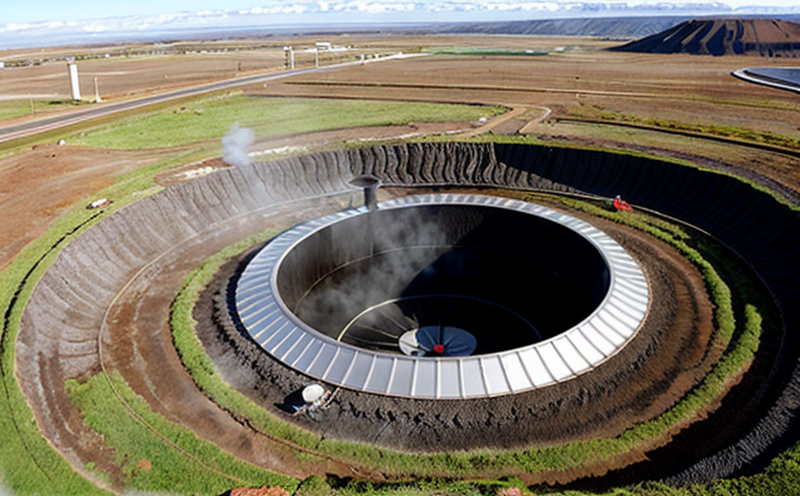ASTM D5398 Groundwater Monitoring Testing in Geothermal Fields
The ASTM D5398 standard is a critical tool used to ensure environmental compliance and safety when it comes to groundwater monitoring in geothermal fields. This service plays an essential role in the energy sector, particularly for those involved in the development and operation of geothermal power plants. The primary objective of this test is to monitor water quality parameters that may be affected by the extraction processes associated with geothermal energy systems.
Geothermal energy harnesses heat from deep within the Earth's crust as a renewable resource for electricity generation or direct heating applications. However, the drilling and production activities can lead to contamination of groundwater resources if not properly managed. ASTM D5398 provides a framework for collecting representative samples of groundwater that undergo rigorous analysis to assess potential impacts on water quality.
The testing procedure outlined in ASTM D5398 involves several steps, including selecting appropriate sampling locations within the geothermal field, ensuring proper sample collection techniques are employed, and analyzing multiple parameters such as pH levels, dissolved oxygen content, salinity, and various chemical constituents like heavy metals. Compliance with this standard is not only beneficial for protecting local ecosystems but also helps companies meet regulatory requirements imposed by government bodies around the world.
By utilizing ASTM D5398 groundwater monitoring tests during geothermal operations, organizations can gain valuable insights into their environmental performance while simultaneously demonstrating due diligence towards maintaining sustainable practices. This service ensures that all aspects of water management are thoroughly evaluated throughout different stages of project development and operation.
The importance of accurate and reliable data cannot be overstated when making decisions regarding resource allocation or process optimization in geothermal facilities. Our laboratory adheres strictly to ASTM D5398 guidelines, providing clients with comprehensive reports that include detailed descriptions of each tested parameter along with interpretations based on industry best practices. We take pride in delivering high-quality results that can help inform strategic business decisions related to environmental protection and operational efficiency.
In summary, ASTM D5398 groundwater monitoring testing is a crucial component of responsible geothermal energy development. By adhering to this standard, stakeholders in the sector can ensure they are meeting both regulatory expectations and internal sustainability goals. Our laboratory offers specialized expertise in conducting these tests with precision and accuracy, supporting clients' efforts toward long-term success.
Why Choose This Test
Selecting ASTM D5398 groundwater monitoring testing is advantageous for several reasons:
- Compliance Assurance: Ensures adherence to international standards, thereby meeting regulatory requirements and reducing risk of non-compliance penalties.
- Data Reliability: Provides accurate and consistent data through standardized procedures, enhancing trustworthiness of environmental assessments.
- Environmental Protection: Helps identify potential sources of contamination early on, allowing for proactive measures to mitigate impacts on natural resources.
- Risk Management: Identifies any risks associated with geothermal operations and enables timely interventions before they escalate into more severe issues.
- Sustainable Practices: Supports the implementation of environmentally friendly practices by providing actionable insights derived from scientifically sound testing methods.
- Customer Satisfaction: Delivers comprehensive reports tailored to individual needs, enabling informed decision-making and improved stakeholder relations.
These factors underscore why choosing ASTM D5398 groundwater monitoring testing is a wise investment for any organization seeking to demonstrate its commitment to environmental responsibility while ensuring operational efficiency.
Environmental and Sustainability Contributions
The implementation of ASTM D5398 standards contributes significantly to the overall sustainability of geothermal energy projects. By closely monitoring groundwater quality, potential risks can be minimized, thus preserving natural resources for future generations. This proactive approach not only enhances public perception but also fosters positive relationships with local communities.
Through continuous evaluation using ASTM D5398 methods, operators have the opportunity to identify areas where improvements are needed and implement corrective actions promptly. Such initiatives contribute positively towards reducing carbon footprints associated with geothermal operations by promoting cleaner energy solutions.
In addition, adhering to these standards helps build confidence among investors who prioritize ethical business practices. It demonstrates a strong commitment to corporate social responsibility (CSR), which is increasingly becoming a key factor influencing investment decisions across various sectors.
Moreover, the adoption of ASTM D5398 contributes to global efforts aimed at combating climate change by encouraging responsible use of renewable resources like geothermal energy. As part of broader sustainability strategies, this testing method plays an integral role in achieving long-term environmental goals set forth by international organizations such as the United Nations.
Overall, integrating ASTM D5398 groundwater monitoring into geothermal projects is not merely about compliance; it represents a strategic move towards fostering sustainable practices that benefit both present and future stakeholders.
Use Cases and Application Examples
The application of ASTM D5398 testing in geothermal fields extends beyond mere compliance; it serves multiple purposes depending on the specific requirements of an organization. Here are some use cases:
- Pre-Construction Assessment: Conducting initial tests helps identify baseline conditions prior to starting construction activities, providing valuable reference points for future monitoring efforts.
- Operational Monitoring: Regularly performing these tests during operations allows continuous evaluation of water quality changes due to ongoing extraction processes. Early detection of anomalies ensures prompt corrective action can be taken if necessary.
- Post-Abandonment Evaluation: Post-abandonment evaluations assess whether there has been any lingering impact on surrounding environments after ceasing operations. This information is crucial for understanding long-term effects and planning remediation efforts where needed.
- New Technology Implementation: When introducing new technologies or processes within a geothermal facility, it's essential to monitor their potential impacts on water quality using ASTM D5398 methods before full-scale deployment.
These examples illustrate how ASTM D5398 testing serves as an indispensable tool throughout various stages of geothermal project lifecycle management. Its versatility makes it applicable across diverse operational scenarios, ensuring comprehensive coverage of environmental aspects crucial to successful implementation.





